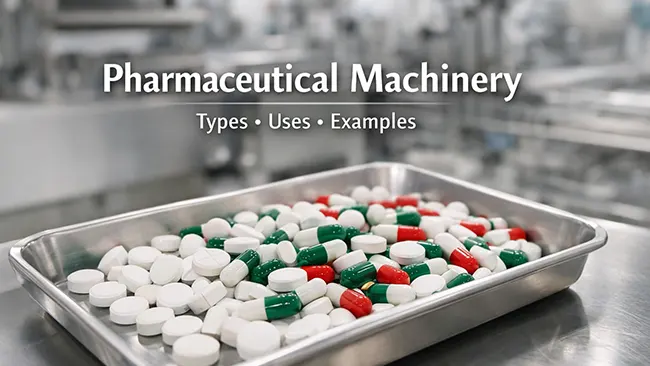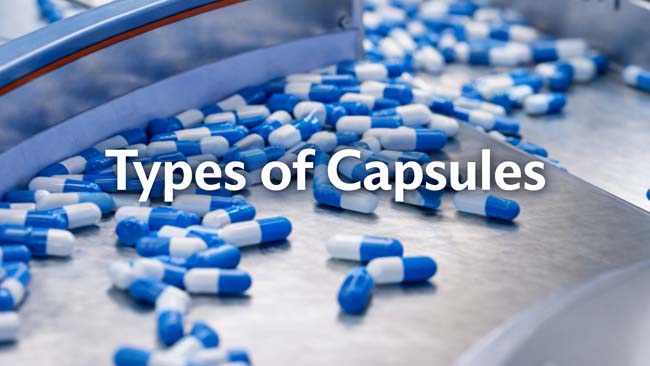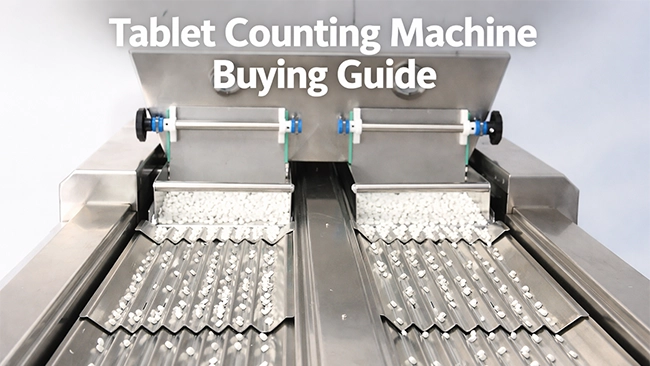Τι είναι η μηχανή συσκευασίας φουσκαλών
Μηχανή συσκευασίας φουσκαλών Μπορεί να συσκευάσει φάρμακα, μέλι και κέτσαπ, ηλεκτρονικό τσιγάρο κ.λπ. σε κυψέλες, η μέγιστη περιοχή χύτευσης είναι 270*270 mm, η μέγιστη απόδοση είναι 30.000 κυψέλες/ώρα. Μπορεί να συνδεθεί με μηχανή πρέσας δισκίων, μηχανή πλήρωσης καψουλών και μηχανή χαρτοκιβωτίων για να σχηματίσει μια αυτοματοποιημένη γραμμή παραγωγής με υψηλή απόδοση παραγωγής.
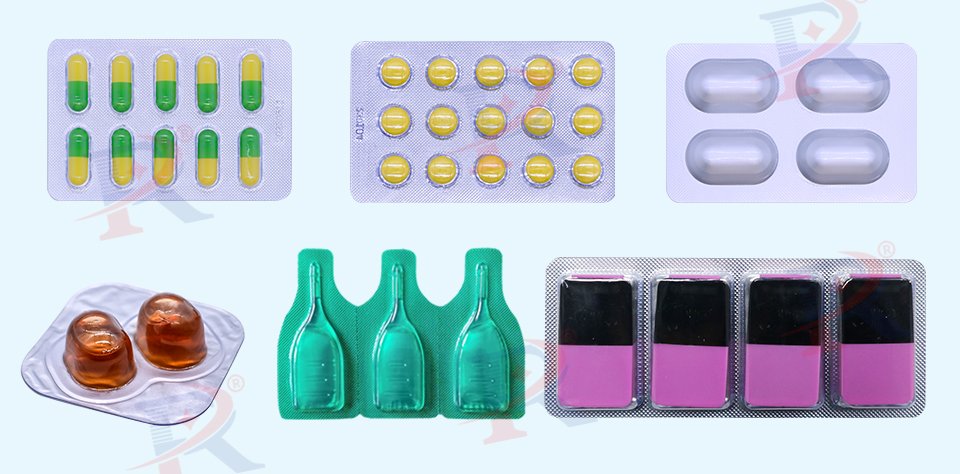
Τύπος μηχανής συσκευασίας φουσκαλών
Σύμφωνα με τον βαθμό αυτοματισμού, μπορούν να χωριστούν σε χειροκίνητη μηχανή συσκευασίας blister, μηχανή συσκευασίας blister επίπεδης πλάκας, μηχανή blister υψηλής ταχύτητας με ρολό, ο κύριος ρόλος είναι η φόρτωση των υλικών στις αλουμινένιες συσκευασίες αλουμινίου-pvc, και σε αλουμινένιες φουσκάλες αλουμινίου για το επόμενο βήμα της συσκευασίας. Η διαφορά μεταξύ της συσκευασίας αλουμινίου-pvc και της συσκευασίας αλουμινίου-αλουμινίου είναι: το υλικό αλουμινίου-pvc είναι φθηνότερο, η συσκευασία αλουμινίου-αλουμινίου μπορεί να προστατευθεί από το φως, κυρίως με βάση τις ανάγκες σας για να επιλέξετε τη σωστή μέθοδο συσκευασίας.
Χειροκίνητη μηχανή συσκευασίας φουσκαλών
Χειροκίνητη μηχανή συσκευασίας φουσκαλών, πρέπει να ολοκληρώσετε χειροκίνητα μια σειρά ενεργειών μόνοι σας.
Προκαταρκτικές προετοιμασίες: σύνδεση ηλεκτρικού ρεύματος, σύνδεση αερίου, αλουμινίου/pvc, αλουμινόχαρτου
Σχηματισμός: όταν η θερμοκρασία φτάσει στο μηχάνημα, ρυθμίστε τη θερμοκρασία χύτευσης, πατήστε το κουμπί χύτευσης, τραβήξτε το αλουμίνιο pvc με το χέρι, χυτεύοντας ένα τράβηγμα προς τα πίσω λίγο
Τροφοδότης: προσθέστε τα δισκία ή τις κάψουλες που θέλετε να συσκευάσετε στην χυτευμένη κυψέλη.
Θερμοκόλληση: Τοποθετήστε την κυψέλη με τα δισκία και το αλουμινόχαρτο στο πάνω και στο κάτω μέρος, πατήστε το κουμπί θερμικής σφράγισης και η μηχανή θα θερμάνει αυτόματα την κυψέλη.
Κοπή: Τοποθετήστε την θερμοκολλημένη κυψέλη αλουμινίου-PVC στον σταθμό κοπής, πατήστε το κουμπί διάτρησης και κοπής και στη συνέχεια θα βγει μια κυψέλη αλουμινίου-πλαστικού.
Μηχανή συσκευασίας κυψελών επίπεδης πλάκας
Με την πρόοδο των καιρών, η ζήτηση για φάρμακα και προϊόντα υγειονομικής περίθαλψης αυξάνεται, η χειροκίνητη μηχανή συσκευασίας κυψέλης λόγω της χαμηλής απόδοσης δεν μπορεί πλέον να καλύψει τη ζήτηση της αγοράς, με αποτέλεσμα η μηχανή συσκευασίας κυψέλης επίπεδης πλάκας να έχει γίνει η προτιμώμενη μηχανή συσκευασίας. Η αρχή λειτουργίας της είναι η ακόλουθη:
Προετοιμασία: Προετοιμασία πρώτων υλών, φθορά μεμβράνης, σύνδεση ψυκτικού συγκροτήματος, σύνδεση ηλεκτρικού ρεύματος, σύνδεση αερίου, χύτευση, θερμική σφράγιση της θέρμανσης της θερμοκρασίας του σταθμού εργασίας στην καθορισμένη τιμή.
Τροφοδοσία: Οι συσκευασίες αλουμινίου-pvc επιλέγουν γενικά τροφοδότη με βούρτσα, οικονομικά αποδοτικός. Οι συσκευασίες αλουμινίου-αλουμινίου επιλέγουν τροφοδοσία τύπου ράγας οδηγού για να αποτρέψουν τις γρατσουνιές στο αλουμινόχαρτο. Τοποθετήστε τα δισκία ή τις κάψουλες στον τροφοδότη, ανοίξτε τον τροφοδότη και τα δισκία θα προστεθούν αυτόματα στην κυψέλη.
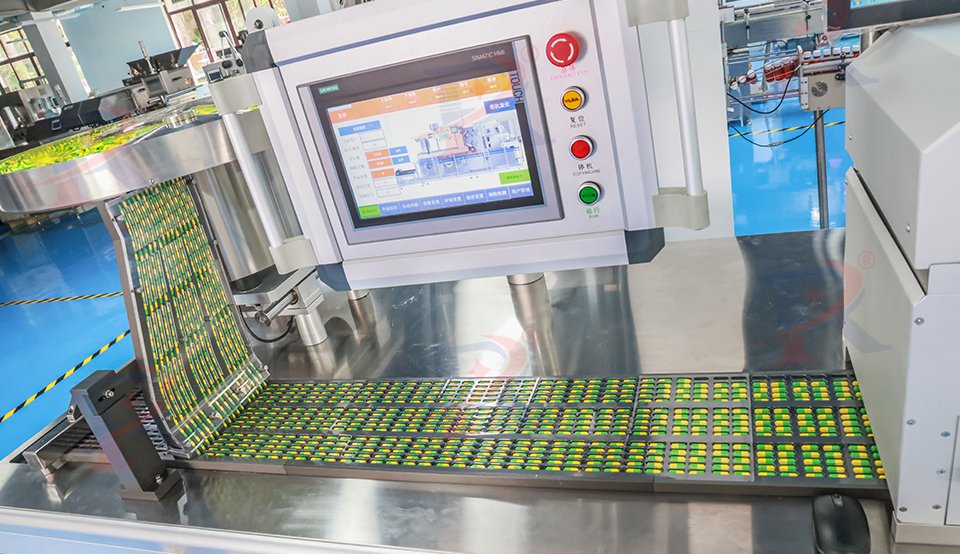
Όλα τα καλούπια μπορούν να προσαρμοστούν, ανάλογα με το μέγεθος και το σχήμα του υλικού, προσαρμοσμένα για διαμόρφωση, θερμική σφράγιση, διάτρηση και κοπή καλουπιών. Εξοπλισμένα με σύστημα ελέγχου Siemens PLC, αυτοματοποιημένη παραγωγή, χωρίς χειροκίνητη παρέμβαση, προσθέστε υλικό μόνο όταν δεν υπάρχει υλικό.
Η μηχανή συσκευασίας κυψελών υγρών προορίζεται κυρίως για την τοποθέτηση του υγρού στην κυψέλη αλουμινίου-pvc, ανάλογα με το ιξώδες του υλικού για να επιλέξετε διαφορετικό τρόπο πλήρωσης, αντλία σύριγγας, περισταλτική αντλία, κεραμική αντλία για την επιλογή σας, οι άλλοι σταθμοί είναι οι ίδιοι με τη μηχανή συσκευασίας κυψελών αλουμινίου-pvc χαπιών.
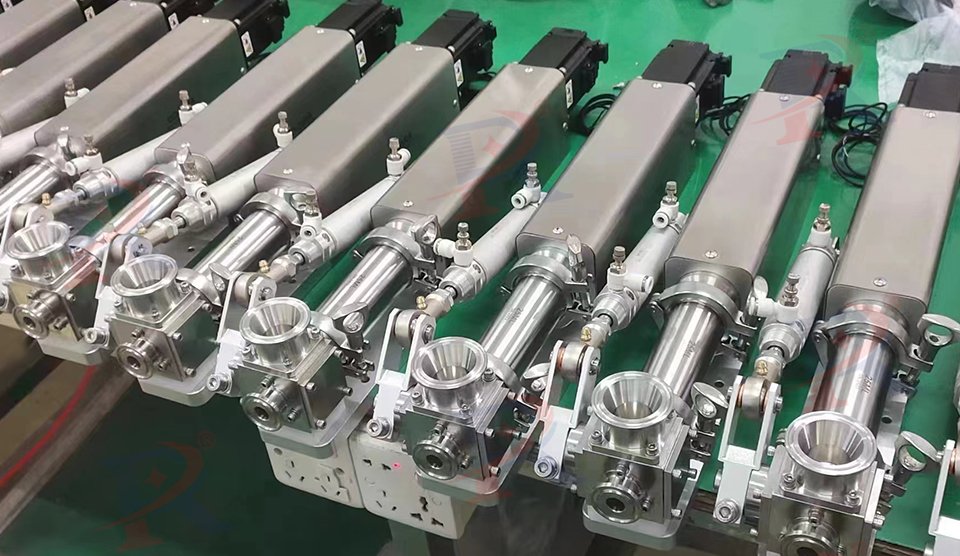
Μηχανή κυψελών κυλίνδρων
Η μηχανή συσκευασίας κυψέλης με ρολό είναι ένα εξελιγμένο κομμάτι εξοπλισμού σχεδιασμένο για την αποτελεσματική συσκευασία δισκίων, καψουλών και άλλων μικρών ιατρικών προϊόντων σε συσκευασίες κυψέλης. Η αρχή λειτουργίας αυτής της μηχανής περιλαμβάνει πολλά βασικά βήματα, καθένα από τα οποία διασφαλίζει την ακριβή και αξιόπιστη συσκευασία φαρμακευτικών προϊόντων. Ακολουθεί μια εις βάθος ματιά στο πώς λειτουργεί μια μηχανή συσκευασίας κυψέλης με ρολό:
Τροφοδοσία Υλικών: Η διαδικασία ξεκινά με την τροφοδοσία των υλικών συσκευασίας. Συνήθως, χρησιμοποιούνται δύο τύποι υλικών: μια βασική μεμβράνη (συνήθως PVC ή αλουμινόχαρτο) και ένα υλικό επικάλυψης (όπως αλουμινόχαρτο). Η βασική μεμβράνη ξετυλίγεται από ένα καρούλι και τροφοδοτείται στη μηχανή, όπου θα σχηματίσει τις κοιλότητες για τα προϊόντα. Το υλικό επικάλυψης ξετυλίγεται επίσης από ένα ξεχωριστό καρούλι και τροφοδοτείται στη μηχανή για μεταγενέστερη σφράγιση.
Θέρμανση και Διαμόρφωση: Η βασική μεμβράνη διέρχεται από έναν σταθμό θέρμανσης όπου θερμαίνεται σε μια ακριβή θερμοκρασία, καθιστώντας την εύκαμπτη και έτοιμη για διαμόρφωση. Στη συνέχεια, η θερμαινόμενη μεμβράνη μετακινείται στον σταθμό διαμόρφωσης, όπου πιέζεται πάνω σε έναν κύλινδρο με καλούπια κοιλότητας. Εφαρμόζονται τεχνικές διαμόρφωσης κενού ή/και πίεσης, με αποτέλεσμα η θερμαινόμενη μεμβράνη να προσαρμόζεται στο σχήμα των καλουπιών, δημιουργώντας τσέπες ή φουσκάλες όπου θα τοποθετηθούν τα προϊόντα.
Τροφοδοσία Προϊόντος: Μόλις σχηματιστούν οι φουσκάλες, το μηχάνημα μετακινεί τη βασική μεμβράνη στον σταθμό πλήρωσης. Εδώ, τα φαρμακευτικά προϊόντα τροφοδοτούνται στις μεμονωμένες κοιλότητες.
Σφράγιση: Αφού τα προϊόντα τοποθετηθούν στις κυψέλες, το μηχάνημα μετακινεί την γεμισμένη μεμβράνη στον σταθμό σφράγισης. Το υλικό επικάλυψης τοποθετείται πάνω από τις γεμισμένες κυψέλες και και τα δύο στρώματα περνούν ανάμεσα από θερμαινόμενους κυλίνδρους σφράγισης. Οι κύλινδροι εφαρμόζουν θερμότητα και πίεση, συγκολλώντας το υλικό επικάλυψης με τη βασική μεμβράνη και σφραγίζοντας αποτελεσματικά τα προϊόντα μέσα στις κυψέλες. Αυτό δημιουργεί μια ασφαλή και απαραβίαστη συσκευασία.
Ψύξη: Οι σφραγισμένες συσκευασίες κυψέλης διέρχονται στη συνέχεια από έναν σταθμό ψύξης. Αυτό το βήμα διασφαλίζει ότι οι σφραγισμένες περιοχές ψύχονται και στερεοποιούνται, διατηρώντας την ακεραιότητα των σφραγίδων και αποτρέποντας οποιαδήποτε παραμόρφωση ή διαρροή.
Διάτρηση και Κοπή: Μόλις κρυώσει, η συνεχής ταινία των συσκευασιών κυψέλης μετακινείται στον σταθμό διάτρησης και κοπής. Εδώ, το μηχάνημα διατρυπά και κόβει την ταινία σε μεμονωμένες συσκευασίες κυψέλης ή μεγαλύτερα φύλλα, ανάλογα με την επιθυμητή διαμόρφωση του τελικού προϊόντος. Αυτό το βήμα συχνά περιλαμβάνει γραμμές διάτρησης για εύκολο σχίσιμο και διαχωρισμό των μεμονωμένων κυψελών.
Επιθεώρηση και Απόρριψη: Το τελικό στάδιο περιλαμβάνει την επιθεώρηση των συσκευασιών blister για ποιοτικό έλεγχο. Τα αυτοματοποιημένα συστήματα ελέγχουν τη σωστή τοποθέτηση του προϊόντος, τη σωστή σφράγιση και τη συνολική ακεραιότητα της συσκευασίας. Οποιεσδήποτε ελαττωματικές συσκευασίες αποβάλλονται αυτόματα από τη γραμμή παραγωγής. Οι ολοκληρωμένες συσκευασίες blister συλλέγονται στη συνέχεια για περαιτέρω συσκευασία ή άμεση διανομή.
Η μηχανή συσκευασίας κυψέλης με ρολό εξασφαλίζει γρήγορη, αποτελεσματική και αξιόπιστη συσκευασία φαρμακευτικών προϊόντων. Αυτοματοποιώντας τη διαδικασία από την τροφοδοσία υλικού έως τον τελικό έλεγχο, αυτές οι μηχανές ενισχύουν σημαντικά την παραγωγικότητα και διατηρούν αυστηρά πρότυπα ποιότητας, καθιστώντας τες απαραίτητο συστατικό στη σύγχρονη φαρμακευτική παραγωγή.
Πλεονεκτήματα της μηχανής συσκευασίας φουσκαλών
Οι μηχανές συσκευασίας σε μπλίστερ προσφέρουν πολλά πλεονεκτήματα, καθιστώντας τες μια προτιμώμενη επιλογή στις φαρμακευτικές και συσκευαστικές βιομηχανίες. Αυτά τα πλεονεκτήματα περιλαμβάνουν την αποτελεσματικότητα, την οικονομική αποδοτικότητα, τον αυτοματισμό και την ενσωμάτωση, μεταξύ άλλων πλεονεκτημάτων.
Υψηλής Ταχύτητας Παραγωγή: Οι μηχανές συσκευασίας σε κυψέλες έχουν σχεδιαστεί για λειτουργία υψηλής ταχύτητας, επιτρέποντας την ταχεία συσκευασία φαρμακευτικών προϊόντων.
Ακρίβεια και Συνέπεια: Αυτά τα μηχανήματα παρέχουν ακριβή έλεγχο των διαδικασιών διαμόρφωσης, πλήρωσης και σφράγισης, με αποτέλεσμα συνεπή και ακριβή συσκευασία.
Ευελιξία: Αυτά τα μηχανήματα μπορούν να χειριστούν ένα ευρύ φάσμα υλικών συσκευασίας και τύπων προϊόντων. Είναι αρκετά ευέλικτα ώστε να συσκευάζουν δισκία, κάψουλες και άλλα μικρά αντικείμενα, προσαρμόζοντας σε διάφορα μεγέθη και σχήματα.
Αποδοτική Χρήση Υλικών: Οι μηχανές συσκευασίας σε μπλίστερ βελτιστοποιούν τη χρήση υλικών συσκευασίας, μειώνοντας τα απόβλητα και το κόστος των υλικών.
Αυτοματοποίηση και Ενσωμάτωση: Οι σύγχρονες μηχανές συσκευασίας blister μπορούν να ενσωματωθούν με άλλο εξοπλισμό στη γραμμή παραγωγής, όπως π.χ. μηχανές χαρτοκιβωτίων και συστήματα επιθεώρησης. Αυτός ο αυτοματισμός βελτιστοποιεί τη διαδικασία συσκευασίας, μειώνοντας τη χειρωνακτική εργασία και αυξάνοντας τη συνολική αποδοτικότητα.
Εφαρμογή μηχανής συσκευασίας φουσκαλών
Οι μηχανές συσκευασίας σε μπλίστερ είναι ζωτικής σημασίας σε διάφορους κλάδους λόγω της ευελιξίας και της αποτελεσματικότητάς τους. Η κύρια εφαρμογή τους έγκειται στον φαρμακευτικό τομέα, αλλά διαδραματίζουν επίσης κρίσιμο ρόλο σε άλλους τομείς.
Φαρμακευτική Βιομηχανία
Δισκία και κάψουλες: Εξασφαλίζοντας ακριβείς δοσολογίες και προστατεύοντάς τες από την υγρασία και τη μόλυνση.
Αμπούλες και Φιαλίδια: Παρέχουν μια ασφαλή και απαραβίαστη συσκευασία.
Βιομηχανία τροφικών προϊόντων
Τα προϊόντα διατροφής, όπως τα συμπληρώματα διατροφής και οι βιταμίνες, συσκευάζονται επίσης συνήθως με μηχανές συσκευασίας σε κυλίνδρους. Οι μηχανές αυτές παρέχουν μια αξιόπιστη και οπτικά ελκυστική λύση συσκευασίας που ενισχύει την παρουσίαση του προϊόντος και την εμπιστοσύνη των καταναλωτών.
Ιατρικές συσκευές
Μικρές ιατρικές συσκευές και εξαρτήματα, όπως σύριγγες, βελόνες και διαγνωστικές ταινίες, συσκευάζονται με αυτά τα μηχανήματα. Η συσκευασία διασφαλίζει την στειρότητα και την ευκολία χειρισμού, παρέχοντας παράλληλα ένα προστατευτικό φράγμα έναντι περιβαλλοντικών παραγόντων.
Καλλυντικά και Προσωπική Φροντίδα
Οι μηχανές συσκευασίας κυψέλης με ρολό χρησιμοποιούνται στη βιομηχανία καλλυντικών για τη συσκευασία ειδών όπως προϊόντα περιποίησης δέρματος, μικρά καλλυντικά δοχεία και εφαρμογές μιας χρήσης. Η συσκευασία βοηθά στη διατήρηση της φρεσκάδας των προϊόντων και παρέχει βολικές μορφές μίας δόσης.
Τρόφιμα και Ζαχαρώδη
Στη βιομηχανία τροφίμων, οι μηχανές συσκευασίας κυψέλης με ρολό χρησιμοποιούνται για τη συσκευασία μικρών ειδών ζαχαροπλαστικής, τσίχλες και άλλων βρώσιμων προϊόντων. Η συσκευασία διασφαλίζει την ασφάλεια του προϊόντος και παρατείνει τη διάρκεια ζωής του, προσφέροντας παράλληλα ελκυστικές επιλογές παρουσίασης.
Οι παραπάνω δηλώσεις αντικατοπτρίζουν την περιορισμένη μου κατανόηση της μηχανής συσκευασίας blister. Εάν έχετε διαφορετικές απόψεις ή ιδέες, καλώς ήρθατε να επικοινωνήσετε μαζί μας. Μηχανικός συσκευασίας Ruida.
